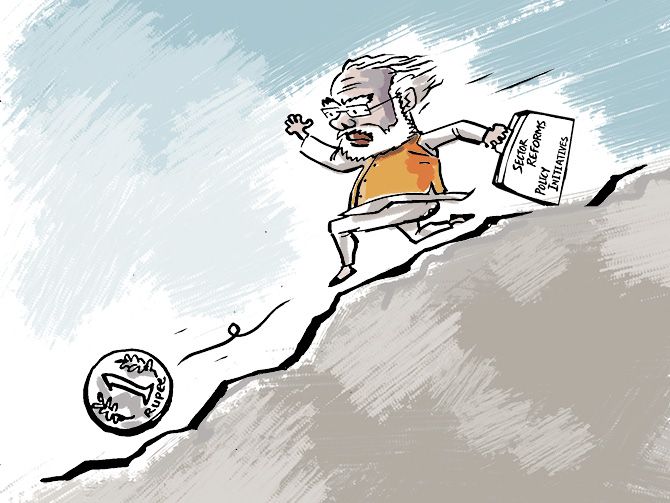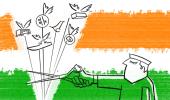'Without bold action to deal with our banking crisis, count on the economy's doldrums to continue for much longer than most of us anticipate,' says Rahul Jacob.
Illustration: Dominic Xavier/Rediff.com

In an age of constant news alerts, bad news feeds on itself until it becomes a kind of mass whispering campaign.
Even discounting for that, the unforgiving run of economic news in the past 10 days or so has been worse than in several years.
Rural household consumption dropping to a seven-year low as both farmers and landless labourers suffer drops in incomes suggests the bottom is falling out of the bottom of the pyramid.
The acute shortage of liquidity among traders and shopkeepers in rural areas, which is forcing multinationals to step in to extend financial support, points to the continuing collateral damage from our crisis in the non-bank financial sector.
The decline in exports for yet another month and a steeper drop in imports brought home the effects of a global/national slowdown.
Just when you think economic news can't get worse, it does.
The volatile industrial Production index contracted month on month by 4.2% in August (seasonally adjusted), the steepest decline in five years.
Even though consumer prices (excluding vegetables) are up a manageable 3.2%, the huge jump in onion prices is a reminder that India is a flailing State, unable to fix these recurrent problems with the storage and supply chain management of a staple food for years on end.
The Reserve Bank's bi-monthly review shone a spotlight on the decline in capacity utilisation at India's factories, which fell to levels just below those seen in 2008 during the global financial crisis.
The RBI's quarterly survey showed business confidence had dropped to levels not seen since the global financial shock.
Order books of manufacturing companies contracted by 23% in the quarter ending June 30.
When the discussion of the economy becomes more widespread than debating politics or cricket, India has a problem.
During the taper tantrum in the summer of 2013, before Raghuram Rajan's eloquent defence helped stabilise things, I happened to visit my often comically blunt Chinese tailor in Hong Kong.
When I told him I was relocating to India, he wondered aloud what sort of person would make such a decision with the rupee in free fall.
Recently, it was a trip to the dentist in Bengaluru that prompted déjà vu.
I had barely slid into my chair at the Khincha dental centre when my dentist remarked on the dichotomy between the $3 billion sold by Amazon and Flipkart et al in their recent festival sales and the general malaise of the economy.
Was it the lipstick effect, he wondered?
His reference was to the theory that in bad times, consumers will selectively spend on a luxury item.
That is as good an explanation as any for the 30% jump in gross merchandise value in the festival sales this year versus last year except that GMV is questionable in accounting terms and not a reliable yardstick of the health of the economy.
Given the scale of discounting and the likelihood that this government will soon issue a fatwa against deep discounting, consumers would have been foolish not to shop.
The jump in e-commerce GMVs aside, there is little to suggest the economy is turning the corner.
In fact, worse may be ahead.
The merry go round that is the world of e-commerce is in the midst of a reality check.
There has been a sharp slowdown in the number of start-up funding deals and in the launch of new start-ups over the past two years, according to a recent analysis in Mint.
For another, if the government signs on to the Regional Comprehensive Economic Partnership, the shock to many of our producers could be severe.
It is not obvious at all that joining is going to miraculously turn around huge trade deficits we currently run with this cohort.
India's trade deficit with these countries almost doubled from $54 billion in 2013-2014 to $105 billion in 2018-2019.
A free trade agreement with Europe, for instance, would be less risky and more beneficial.
Given the mounting stresses in the economy, it is quite probable we will have another alarming revelation or three in the financial sector.
As Ananth Narayan, former regional head for financial markets for Southeast and South Asia at Standard Chartered, points out in a piece for CNBC, 'NBFCs reported (gross non-performing assets) GNPA of 6.6% of advances as of March 2019 lower than the 9.3% reported by banks. Few analysts believe this reported NBFC GNPA.'
He suggests India follow an initiative in the late 1990s to carve out bad assets from Malaysia's financial system.
After the Asian financial crisis, the government-backed Danaharta bid for Malaysia's large stressed assets.
Financial institutions could refuse to sell, but were then required to take punishing provisions on the assets.
On the other hand, 'if Danaharta recovered more than the original bid price through the resolution process, 80% of the surplus recovery was returned to the original financial institution,' writes Narayan.
Danaharta eventually reported an overall recovery rate of almost 60%.
Without similarly bold action to deal with our banking crisis, count on the economy's doldrums to continue for much longer than most of us anticipate.












 © 2025
© 2025